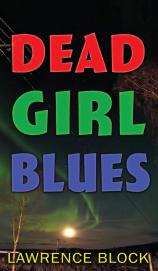Dead Girl Blues
Review
Dead Girl Blues
There is always a backstory. It just doesn’t always get told, sometimes because what has gone before is not all that interesting. That is not the case with DEAD GIRL BLUES.
I’ll keep it brief. Lawrence Block recently wrote a book. He didn’t consider it to be particularly commercial, and there was concern that parts of it would be off-putting to the sensibilities of some readers. He decided to publish it on his own (on his birthday, no less) and showed it to a number of friends and acquaintances. The reaction of many, including myself, is that it is one of the best novels he has ever written.
"...a brilliant hybrid of a crime novel and first-person psychological study where the subject attempts --- not always successfully --- to analyze himself."
Block started writing and publishing his work in the late 1950s, at around the time that I was discovering detective and noir fiction. By the mid-’60s, his books --- under his own name and a host of pseudonyms --- were all over those revolving wire paperback racks. DEAD GIRL BLUES reminds me of those stories, at least in subject matter and to some extent in tone. What rocks it to the top of my favorites list is that it has the benefit of the writing chops that Block has developed and honed to a razor-sharp point over the intervening six decades. It is a best-of-two-worlds scenario.
So what is the book about? A thrill killer. A sexual thrill killer, actually. Roger Edward Borden and a woman named Cindy Raschmann pick each other up in a honky bar in Bakersfield, California, one night in 1968. They leave together. And in due course, Borden murders and rapes her --- in that order --- and hides her corpse. By the time it is discovered a week or so later, he is far from the scene.
Borden makes his way east and lands in Lima, Ohio. One thing leads to another, and Borden --- who is now John Thompson --- becomes modestly successful, marries, and settles down with his wife and two children. Still, he has not forgotten about Cindy. Science has made it easier to solve cold cases, and Thompson’s carefully constructed story of his past begins to fall apart. Suddenly, he acquires an unexpected ally. But will it be enough, and is it too late to help him?
Is DEAD GIRL BLUES for everyone? Maybe not. It is, however, a brilliant hybrid of a crime novel and first-person psychological study where the subject attempts --- not always successfully --- to analyze himself. In the meantime, there is a clock that ticks faintly in the background across the years and threatens to chime. You will want to be there if and when it does.
Reviewed by Joe Hartlaub on June 25, 2020




